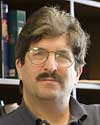 |
 |
Gary Ruvkun, Ph.D.
Gary Ruvkun is Professor of Genetics at Harvard Medical School. His lab uses C. elegans molecular genetics and genomics to study problems in developmental biology and physiology. Dr. Ruvkun is a graduate of UC Berkeley and Harvard. His PhD thesis with Fred Ausubel explored the nitrogen fixation genes of Rhizobium, a bacteria that forms a symbiotic relationship with leguminous plants. Dr. Ruvkun discovered that the nif genes are conserved over 3 billion years of prokaryotic evolution, which prepared him for the comparative genomics of the more recent past.
Dr. Ruvkun began to work with C. elegans as a postdoc with Bob Horvitz at MIT and Walter Gilbert at Harvard, where he explored the heterochronic genes that control the temporal dimension of development. This work led to the discovery of the first microRNA genes and their mRNA targets by the Ambros and Ruvkun labs, the discoveries by the Ruvkun lab that the mechanism of microRNA regulation of target mRNAs is post-transcriptional and that some microRNA genes are conserved across animal phylogeny, the computational discovery of hundreds of microRNAs by the Ruvkun and Church labs, and the discovery of a common core microRNA and RNAi mechanism by the Ruvkun and Mello labs.
Dr. Ruvkun’s lab is now using functional genomic and genetic strategies to systematically discover the components of the RNAi and microRNA pathways in C. elegans. They have recently identified many genes that positively or negatively regulate RNAi and microRNA pathways. These genes reveal the trajectory of siRNAs and miRNAs as they target mRNAs, as well as components that may be developed as drug targets to enhance RNAi in mammals. Such technical improvements in RNAi may be necessary to elevate a laboratory tool to a therapeutic modality.
Click here for more information on the Ruvkun Labs.
Click here for Gary Ruvkun's page at Harvard Biophysics.
|
|
| |
| Curriculum Vitae |
|
Click here to link to CV [Adobe Acrobat format]
|
|

